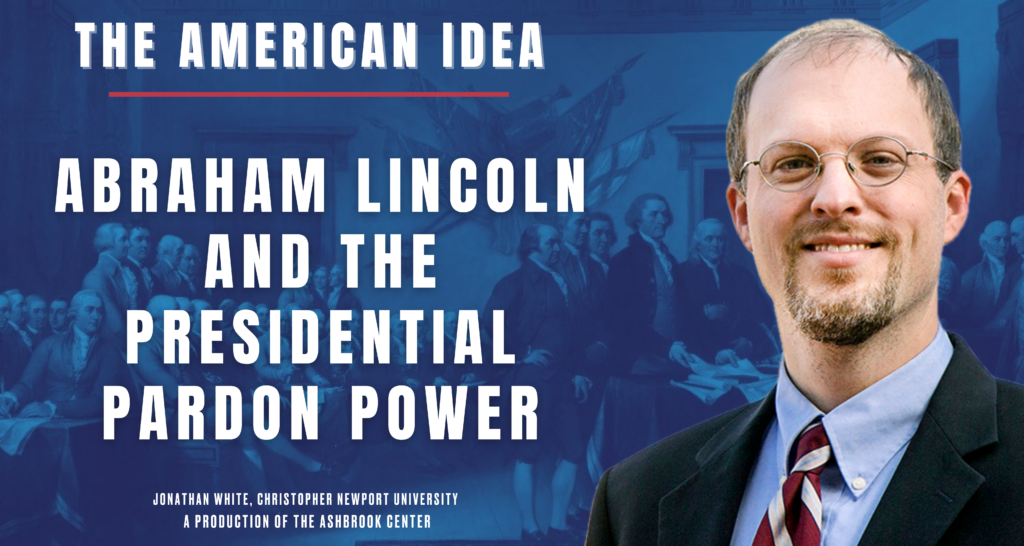The Presidential Pardon and Abraham Lincoln's Views on Justice
February 5, 2025

Listen and subscribe to the podcast
Join The American Idea’s Listener Email list – get news about upcoming episodes and a chance to offer questions for them, too!
The Presidential Pardon Power: Origins and Evolution
The presidential pardon, an enduring feature of the U.S. Constitution, traces its roots back to the English monarchy. Under the British Crown, the king wielded the power of clemency as a tool to temper justice with mercy. The Founding Fathers, inspired by this precedent, incorporated the pardon power into Article II, Section 2 of the Constitution. Their aim was to equip the president with a mechanism to resolve conflicts, restore peace, and deliver compassion where strict application of the law might lead to undue harshness.
This authority is broad but not unlimited. While the president can pardon or commute sentences for federal offenses and military crimes, this power does not extend to state-level crimes or impeachments. The Founders, particularly Alexander Hamilton, defended its inclusion by emphasizing the necessity of quick, decisive action in times of national crisis. Writing in Federalist 74, Hamilton argued that the pardon power would allow the president to quell insurrections and promote reconciliation, often without the delays inherent in legislative debate. From its inception, the pardon has been viewed as a double-edged sword, capable of healing societal wounds but also ripe for potential misuse.
Early Uses and Political Transformations
During America’s earliest years, presidents used the pardon power to stabilize a fledgling republic. George Washington’s pardons for participants in Shay’s Rebellion and the Whiskey Rebellion exemplified its use as a tool for national harmony. By extending clemency to insurgents, Washington and John Adams demonstrated the federal government’s authority while also fostering reconciliation. These early examples reflect the pardon power’s original intent: to mend divisions and temper justice with humanity.
Over time, however, the use of pardons shifted, becoming increasingly politicized. In the 20th century, presidents began to grant clemency to political allies and well-connected individuals, sparking debates about the ethical boundaries of this power. Notable controversies, such as Gerald Ford’s pardon of Richard Nixon following the Watergate scandal, underscored its potential to erode public trust. Ford’s decision, though framed as an act of national healing, alienated many Americans and contributed to his electoral defeat in 1976.
In more recent decades, the pardon power has oscillated between magnanimity and political expediency. President Joe Biden, for instance, has issued a record number of pardons and commutations, including for over 1,500 prisoners and 37 death row inmates. These actions have reignited debates about the scope and impact of presidential clemency, highlighting both its capacity for mercy and its potential for controversy.
Abraham Lincoln and the Art of Mercy
No president exemplifies the compassionate use of the pardon power more vividly than Abraham Lincoln. Leading the nation through the Civil War, Lincoln wielded his authority to address the unique challenges of a divided and war-torn country. His clemency decisions often reflected his profound sense of justice and empathy, as well as his understanding of the complexities of war.
One notable aspect of Lincoln’s pardon policy was his leniency toward military offenders. Sleeping sentinels and soldiers convicted of minor infractions frequently received Lincoln’s mercy. He believed that many of these individuals, particularly young and inexperienced soldiers, acted out of exhaustion or fear rather than malice. By granting pardons, Lincoln sought not only to spare lives but also to maintain morale within the Union army.
Lincoln’s approach to pardons extended beyond individual acts of mercy. His handling of the Dakota War in 1862 reveals his commitment to proportional justice. Following a series of violent clashes between the U.S. military and Dakota fighters, public outcry demanded severe retribution. Lincoln carefully reviewed the cases of 303 Dakota men sentenced to death, ultimately approving the execution of only 38 individuals directly implicated in war crimes. This decision, though controversial, demonstrated Lincoln’s willingness to balance public sentiment with his principles of fairness and restraint.
Lincoln’s Legacy and Modern Parallels
In addition to his wartime clemency, Lincoln’s actions against the transatlantic slave trade highlight his use of the pardon power as a tool for justice. He pursued and prosecuted slave traders with vigor, exemplified by his decision to execute Nathaniel Gordon, a captain found guilty of transporting nearly 900 enslaved Africans. This act underscored Lincoln’s commitment to combating one of humanity’s most heinous practices.
The themes of mercy and justice that characterized Lincoln’s presidency resonate in contemporary debates over the pardon power. President Biden’s extensive use of clemency has drawn comparisons to earlier eras when the pardon was a vehicle for both reconciliation and controversy. Yet, as with Lincoln, Biden’s decisions also reflect the enduring tension between justice and compassion. Questions about the ethical implications of pardoning large numbers of prisoners or high-profile individuals continue to challenge the presidency, ensuring that the pardon power remains a subject of national scrutiny.
Conclusion: Justice Tempered by Mercy
Abraham Lincoln’s use of the pardon power offers a profound lesson in leadership during times of crisis. His decisions, guided by a deep sense of justice and humanity, reveal the potential of presidential clemency to heal wounds and uphold moral principles. While the pardon power has evolved and at times been marred by controversy, its fundamental purpose endures. From the Founding Fathers’ vision to Lincoln’s compassionate interventions and beyond, the pardon remains a vital instrument for balancing the scales of justice and demonstrating the enduring value of mercy.

